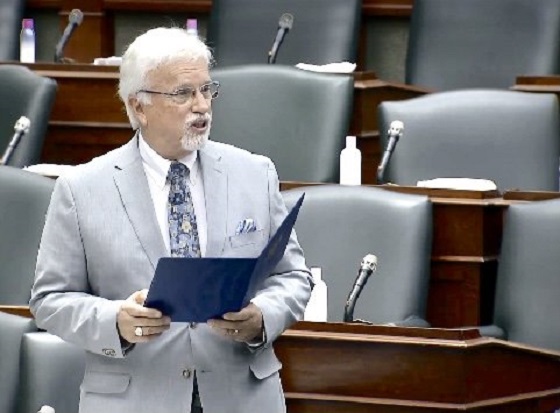International
British political commentator says Trudeau must go. World’s largest political youth organization horrified at Canada.

Canadians have always loved it when the rest of the world talks about our nation. Normally it’s because of an athlete or an artist who is on top of their game. Sometimes it’s our military accomplishments, or our peacekeeping leadership. Currently, Canada is making headlines for all the wrong reasons as the rest of the world struggles to understand what is happening in Canada to protestors who are clearly not violent (even if some find them incredibly annoying).
Best selling author Douglas Murray is a journalist with The Spectator, based in Britain.

Douglas Murray’s latest publication, The Madness of Crowds was a bestseller and ‘book of the year’ for The Times and The Sunday Times. Murray has also contributed to The Wall Street Journal, The Times, The Sunday Times, The Sun, The Evening Standard, and is a regular contributor to National Review. Murray founded the Centre for Social Cohesion, the first British think-tank studying extremism and terrorism.
This week, Douglas Murray was featured in this interview on SkyNews Australia.
Meanwhile in India, Tajinder Pal Singh Bagga, the National Secretary of the world’s largest youth political organization (called Bharatiya Janata Party Youth), has spoken out about the situation in Canada. The parent organization of the youth group, the Bharatiya Janata Party (BJP) is the World’s largest Political Party. Indian Prime Minister Narendra Modi belongs to this political party.
After seeing video from Canadian news organizations, Tajinder Pal Singh Bagga expressed horror at the treatment of peaceful protestors by the Canadian authorities.
I am not able to eat anything from last 24 hours after watching this video. how can @JustinTrudeau attack his own country people. Justin Converted beautiful Canada into Banana Republic. #TrudeauDictatorshipMustGo pic.twitter.com/WWwgMN4OsV
— Tajinder Pal Singh Bagga (@TajinderBagga) February 19, 2022
conflict
Columbia on Lockdown After pro-Palestinian Protesters Take Over Building, Hold Janitors Hostage

From Heartland Daily News
Columbia University locked down its campus Tuesday to everyone but essential personnel and students after anti-Israel protesters smashed windows and barricaded themselves inside Hamilton Hall early in the morning.
A staff member in the building at the time said he was temporarily taken hostage, The Columbia Spectator reports.
As of 9 a.m. Tuesday, the New York university even barred the media from campus “as a safety measure,” a news update states.
“Access to campus has been limited to students residing in residential buildings on campus and employees who provide essential services to campus buildings, labs, and residential student life,” according to the announcement.
The Spectator reports more:
The [lock down] comes six hours after around three dozen protesters occupied Hamilton Hall, pledging to remain inside the building until the University meets its stated demands, including divestment from Israel, financial transparency, and amnesty for students detained and suspended in the mass arrests on April 18.
Protesters sealed off the building minutes after entry, barricading the doors with wooden tables, chairs, and zip ties. Demonstrators outside moved the metal tables outside Hartley Hall to the front of the doors, securing them shut with ropes and zip ties.
A facilities worker said he was temporarily held hostage but allowed to leave about 10 minutes later, according to the student newspaper. Later, two other janitors said they also were temporarily held hostage, according to Fox News.
Columbia has fallen
Pro-Palestinian protesters have reportedly taken a building by force and barricaded themselves inpic.twitter.com/fhFbOmZVwY
— The College Fix (@CollegeFix) April 30, 2024
Several students also reported being assaulted by protesters trying to enter the building, according to an X video by freelance reporter Jessica Schwalb.
Student is assaulted by mob. @NYPDDaughtry Many students have called the police but where are you???
We are in danger. pic.twitter.com/ghZWuMgb6y
— Jessica Schwalb (@jessicaschwalb7) April 30, 2024
Pro-Palestinian protests have been going on for weeks at Columbia, with some demonstrators establishing a “Gaza Solidarity Encampment” on the lawn.
On Monday, university spokesperson Ben Chang said students began receiving suspension notices after ignoring repeated warnings to leave their encampment by 2 p.m. that day.
“Students who agreed to leave and sign a form committing to abide by University policies will be allowed to complete the semester,” Chang said in a campus update.
Some faculty members, many of them wearing masks, joined the protesters just ahead of the 2 p.m. deadline, locking arms to form a human chain around the encampment, according to videos on X.
Unbelievable. Columbia faculty lock arms to prevent police from clearing the encampment. Why do they still have jobs? pic.twitter.com/XrKlNCOx3q
— Ian Miles Cheong (@stillgray) April 29, 2024
As of Tuesday morning, the pro-Palestinian demonstrators continue to occupy the building. The Spectator reports New York Police Department officers have been at the scene since about 12:45 a.m. but have not entered the building.
COVID-19
States move to oppose WHO’s ‘pandemic treaty,’ assert states’ rights

From LifeSiteNews
Utah and Florida passed laws intended to prevent the WHO from overriding states’ authority on matters of public health policy, and Louisiana and Oklahoma have legislation set to take effect soon pending final votes.
Two states have passed laws – and two states have bills pending – intended to prevent the World Health Organization (WHO) from overriding states’ authority on matters of public health policy.
Utah and Florida passed laws and Louisiana and Oklahoma have legislation set to take effect soon pending final votes. Several other states are considering similar bills.
The WHO member states will convene next month at the World Health Assembly in Geneva, Switzerland, to vote on two proposals – the so-called “pandemic accord” or “pandemic treaty,” and amendments to the International Health Regulations (IHR) – that would give the WHO sweeping new pandemic powers.
The Biden administration supports the two WHO proposals, but opposition is growing at the state level.
Proponents of the WHO’s proposals say they are vital for preparing humanity against the “next pandemic,” perhaps caused by a yet-unknown “Disease X.”
But the bills passed by state legislatures reflect frequently voiced criticisms that the WHO’s proposals imperil national sovereignty, medical and bodily sovereignty and personal liberties, and may lead to global vaccine mandates.
Critics also argue the WHO proposals may open the door to global digital “health passports” and global censorship targeting alleged “misinformation.”
Such criticisms are behind state legislative initiatives to oppose the WHO, on the basis that states’ rights are protected under the 10th Amendment of the U.S. Constitution. Under the 10th Amendment, all powers not delegated to the federal government are reserved to the states. Such powers, critics say, include public health policy.
Mary Holland, president of Children’s Health Defense (CHD), told The Defender:
It is encouraging to see states like Louisiana, Oklahoma, and Utah pass resolutions to clarify that the WHO has no power to determine health policy in their states. Historically, health has been the purview of state and local government, not the U.S. federal government.
There is no legitimate constitutional basis for the federal government to outsource health decision-making on pandemics to an international body. As state legislatures become aware of the WHO’s agenda, they are pushing back to assert their autonomy – and this is welcome.
Internist Dr. Meryl Nass, founder of Door to Freedom, told The Defender that, contrary to arguments that the drafters of the constitution could not foresee future public health needs, vaccines, doctors, and medicine were all in existence at the time the 10th Amendment was written. They were “deliberately left out,” she said.
READ: Thousands of protesters rally in Tokyo against proposed WHO pandemic treaty
This has implications for the federal government’s efforts in support of the WHO’s proposals, according to Nass. “The government doesn’t have the authority to give the WHO powers for which it lacks authority,” she said.
Tennessee state Rep. Bud Hulsey (R-Sullivan County) told The Epoch Times, “We’re almost to a place in this country that the federal government has trampled on the sovereignty of states for so long that in peoples’ minds, they have no options.”
“It’s like whatever the federal government says is the supreme law of the land, and it’s not. The Constitution is the supreme law of the land,” he added.
Utah, Florida laws passed
On January 31, Utah Gov. Spencer Cox (R) signed Senate Bill 57, the “Utah Constitutional Sovereignty Act,” into law. It does not mention the WHO, but prohibits “enforcement of a federal directive within the state by government officers if the Legislature determines the federal directive violates the principles of state sovereignty.”
In May 2023, Florida passed Senate Bill 252 (SB 252), a bill for “Protection from Discrimination Based on Health Care Choices.” Among other clauses, it prohibits businesses and public entities from requiring proof of vaccination or prophylaxis for the purposes of employment, receipt of services, or gaining entry to such entities.
According to Section 3 of SB 252:
A governmental entity as defined… or an educational institution… may not adopt, implement, or enforce an international health organization’s public health policies or guidelines unless authorized to do so under state law, rule, or executive order issued by the Governor.
Nass told The Defender that Florida’s legislation offers a back door through which the state can implement WHO policies because it allows a state law, rule, or executive order by the governor to override the bill. According to Nass, efforts to strengthen the bill have been unsuccessful.
SB 252 was one of four bills Florida Gov. Ron DeSantis (R) signed in May 2023 in support of medical freedom. The other bills were House Bill 1387, banning gain-of-function research, Senate Bill 1580, protecting physicians’ freedom of speech, and Senate Bill 238, prohibiting discrimination on the basis of people’s medical choices.
Louisiana, Oklahoma also push back against the WHO
The Louisiana Senate on March 26 voted unanimously to pass Senate Law No. 133, barring the WHO, United Nations (U.N.) and World Economic Forum from wielding influence over the state.
According to the legislation:
No rule, regulation, fee, tax, policy, or mandate of any kind of the World Health Organization, United Nations, and the World Economic Forum shall be enforced or implemented by the state of Louisiana or any agency, department, board, commission, political subdivision, governmental entity of the state, parish, municipality, or any other political entity.
The bill is now pending Louisiana House of Representatives approval and if passed, is set to take effect August 1.
On April 24, the Oklahoma House of Representatives passed Senate Bill 426 (SB 426), which states, “The World Health Organization, the United Nations and the World Economic Forum shall have no jurisdiction in the State of Oklahoma.”
READ: Lawmakers, conservatives blast WHO plan for ‘global governance’ on future pandemics
According to the bill:
Any mandates, recommendations, instructions, communications or guidance issued by the World Health Organization, the United Nations or the World Economic Forum shall not be used in this state as a basis for action, nor to direct, order or otherwise impose, contrary to the constitution and laws of the State of Oklahoma any requirements whatsoever, including those for masks, vaccines or medical testing, or gather any public or private information about the state’s citizens or residents, and shall have no force or effect in the State of Oklahoma.
According to Door to Freedom, the bill was first introduced last year and unanimously passed the Senate. An amended version will return to the Senate for a new vote, and if passed, the law will take effect June 1.
Legislative push continues in states where bills opposing the WHO failed
Legislative initiatives opposing the WHO in other states have so far been unsuccessful.
In Tennessee, lawmakers proposed three bills opposing the WHO, but “none of them made it over the finish line,” said Bernadette Pajer of the CHD Tennessee Chapter.
“Many Tennessee legislators are concerned about the WHO and three of them filed resolutions to protect our sovereignty,” Pajer said. “Our legislature runs on a biennium, and this was the second year, so those three bills have died. But I do expect new ones will be filed next session.”
The proposed bills were:
- House Joint Resolution 820(HJR 820), passed in the Tennessee House of Representatives. The bill called on the federal government to “end taxpayer funding” of the WHO and reject the WHO’s two proposals.
- House Joint Resolution 1359(HJR 1359) stalled in the Delayed Bills Committee. It proposed that “neither the World Health Organization, United Nations, nor the World Economic Forum shall have any jurisdiction or power within the State of Tennessee.”
- Senate Joint Resolution 1135(SJR 1135) opposed “the United States’ participation in the World Health Organization (WHO) Pandemic Prevention Preparedness and Response Accord (PPPRA) and urges the Biden Administration to withdraw our nation from the PPPRA.”
Amy Miller, a registered lobbyist for Reform Pharma, told The Defender she “supported these resolutions, especially HJR 1359. She said the bill “went to a committee where the sponsor didn’t think it would come out since a unanimous vote was needed and one of the three members was a Democrat.”
Tennessee’s HJR 820 came the closest to being enacted. According to Nass, this bill was “flawed,” as it “did not assert state sovereignty or the 10th Amendment.”
Another Tennessee bill, House Bill 2795 and Senate Bill 2775, “establishes processes by which the general assembly [of the state of Tennessee] may nullify an unconstitutional federal statute, regulation, agency order, or executive order.”
According to The Epoch Times, this would give Tennessee residents “the right to demand that state legislators vote on whether or not to enforce regulations or executive orders that violate citizens’ rights under the federal or state constitutions.” The bill is tabled for “summer study” in the Senate.
In May 2023, Tennessee passed legislation opposing “net zero” proposals and the U.N. Sustainable Development Goals – which have been connected to “green” policies and the implementation of digital ID for newborn babies and for which the U.N. has set a target date of 2030 for implementation.
According to The Epoch Times, “Maine state Rep. Heidi Sampson attempted to get a ‘joint order’ passed in support of personal autonomy and against compliance with the WHO agreements, but it garnered little interest in the Democrat supermajority legislature.”
In Alabama, the Senate passed House Joint Resolution 113 opposing the WHO. The bill was reported out of committee but, according to Nass, it stalled.
Other states where similar legislation was proposed in the 2024 session or is pending include Georgia, Idaho, Iowa, Kentucky, Michigan, New Hampshire, New Jersey, South Carolina, and Wyoming.
Recent Supreme Court ruling may curtail federal government’s powers
While opponents of the WHO’s proposed “pandemic agreement” and IHR amendments point to the states’ rights provision of the 10th Amendment, others argue that a 1984 U.S. Supreme Court decision in Chevron v. Natural Resources Defense Council allowed federal agencies to assert more authority to make laws.
The tide may be turning, however. According to The Epoch Times, “The current Supreme Court has taken some steps to rein in the administrative state, including the landmark decision in West Virginia v. Environmental Protection Agency, ruling that federal agencies can’t assume powers that Congress didn’t explicitly give them.”
Nass said that even in states where lawmakers have not yet proposed bills to oppose the WHO, citizens can take action, by contacting the office of their state governor, who can issue an executive order, or their attorney general, who can issue a legal opinion.
Door to Freedom has also developed a model resolution that state legislative bodies can use as the basis for their own legislation.
“It’s important for people to realize that if the federal government imposes something on the people, the people can go through their state’s powers to overturn it,” Nass said.
This article was originally published by The Defender — Children’s Health Defense’s News & Views Website under Creative Commons license CC BY-NC-ND 4.0. Please consider subscribing to The Defender or donating to Children’s Health Defense.
-

 Alberta1 day ago
Alberta1 day agoAlberta threatens to fight Trudeau government restrictions on Canada’s plastics industry
-

 Alberta2 days ago
Alberta2 days agoPrincipal at Calgary Elementary School charged with possession of child pornography
-

 COVID-191 day ago
COVID-191 day agoFormer Canadian lawmaker has no regrets about refusing COVID shot despite losing his job
-

 COVID-1924 hours ago
COVID-1924 hours agoPeckford: Hallelujah! Supreme Court of Canada to hear Newfoundland and Labrador charter case
-

 Alberta12 hours ago
Alberta12 hours agoAlberta’s vision for passenger rail
-

 Fraser Institute2 days ago
Fraser Institute2 days agoFederal government’s fiscal record—one for the history books
-

 Uncategorized12 hours ago
Uncategorized12 hours agoMaking Alberta a geothermal energy leader
-

 Alberta1 day ago
Alberta1 day agoCanada’s postal service refuses to help with Trudeau’s gun ban buyback program: report








